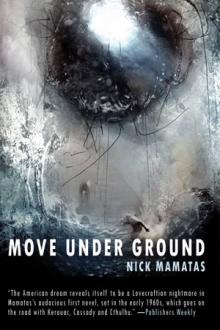Move Under Ground, Nick Mamatas [reading rainbow books .txt] 📗

- Author: Nick Mamatas
- Performer: 0809556731
Book online «Move Under Ground, Nick Mamatas [reading rainbow books .txt] 📗». Author Nick Mamatas
Finally, I pulled over at the YMCA. Old Bull’s childhood piggybank would pay for a night or two. The Cadillac I pointed snout out and ready to go, nobody parallel parked anymore. It was the little things I noticed. The peculiar half-East, half-West of Chicago was only subtly warped by the shoggoth population. “Potatoheads,” Bill muttered to me, while Neal ran off to the corner to talk to one, a middle-aged colored woman with swinging hips. They embraced quickly, like veterans, patting each other on the back, and walked off without Neal even saying goodbye.
Bill’s old coins weren’t marked with the Elder Sign, either the thin branch or the burning five-pointed star with that great fried-egg-eye in the middle of it, so we weren’t going to be getting a room. The car of American dreams had conveniently faded back to the ether and mother Earth quaked again, stretching and cracking the city’s streets in every direction. Bill stood all hunched up, wearing his suit like he was a child trying on Papa’s clothes, fabric pooled around his shoulders, wrists and ankles. What an unclean little man he was; I just felt the urge to punch him, just to see the slime bubble and splurt out of his earholes. But instead I told him of how last time when I was here with Neal, when our Cadillac was a steel prophet and not a speedy phantasm, we listened to bebop and on the intermissions would growl down the streets in our car until God showed up.
“George Shearing, giant old egghead. A master of the ivories. Every stroke a completed action, a day in the life of a tragic hero. You know, Bill? God. Last time I was in Chicago, I was in the very same room with God.”
“I see God right now,” Bill said, his eyebrows up, and I turned around to see Cyclopean modern towers and pinnacles rising flowerlike and delicate like spun crystal to reach for the black and deadly sky. No Cthulhu, none of the swirling red stars of Azathoth mocking us from the heavens, just black. The stars were all dead as coal, the moon blasted to less than dust by the thunder of rockets. And silence. The weird ululations of the city’s ruckus fell to a whisper, and then into nothingness. Mother Earth inhaled again, and her fecund bulk shifted, tenderly like Memere brushing my bangs from my eyes as a little boy. And there was God in that blasted night, the God of oblivion where even the horrid clash of pincers, scales and flailing tentacles fade to the wonder of nothingness.
“Kireji!” I cried out desperately. My word didn’t echo across the curving alleys or the passages lined with red Gregorian brick, buildings designed to weather winter’s hammer, but which seemed like naught but gilded futility to me. We were alone in this universe, a wonder that came to me all at once as I saw the God Bill saw. God is the absence of this all, of us all. “Kireji!” I shouted again, and the furious exhalation died just past my lips. Kireji, that decisive moment in the haiku, where one syllable betrays a thought, a shift in the breath, the contemplation of time and nature without emotion; but nature was too foul and dark. Even God had turned His head away from us, away from Ii Jean when I needed Him most.
If I had all the paper on the earth, I couldn’t express what I saw that night, but seventeen syllables of haiku, perhaps that would have been too much. “For now we see through a glass, darkly; but then face to face,” I said to myself (could Bill even hear me; I felt Great Mother still slowly exhaling, the curve of the earth swelling and drawing me up towards the sky). “Now I know.” I didn’t finish the verse. I did know, because I was staring up at the dark glass of the Chicago night.
This was supposed to be some kind of drama. I’d been given just enough information to get by, thanks to little buzzes in my ear by the demon Kilaya, my sweet and pure Marie. Neal showed up just in time; so did Allen and so did Bill. Hell, so did the old bums and the bennies and the truckers and cool bottles of Coke for sale on the side of the highway by some round peach of an old lady with flabby arms and a wrinkly smile. We may well have been immune to the siren call of the cult; our features were still men’s features, our profiles human, but we were being pushed and shoved around, like a kid making an inchworm crawl down some specific twig and onto a particular leaf that just happens to be square on the bottom of a crystal-clear Mason jar. The sky was clear that night too.
“See,” Bill said. “There’s Neal!” Then he cackled, his laugh wet and nasty. He was just happy to be out of the damn car.
Neal was heading back our way, an entourage of cheering cultists and hoboes, all drunk and stuffed to the gills with Vienna Beef, behind him. Trudging quietly amidst the group was this little Mexican girl, walking like she was on her way to First Communion.
Neal hugged me hard (he was flabby just a few minutes ago, now his arms were like steel cables twisted around granite bones) and said, “You’re standing up for me, Jack! I’m getting married tonight! It’ll be a great little scene for my book. Marriage, a night alone with my little girl in a little Chicago railroad apartment, the el chugging away outside— I’ll leave out the bit about the trains being nothing but giant white worms snaking across the city like the tracks were garden paths—making sweet love before heading out to that final battle with lords dark and sundry, with two boon companions at my side. A surefire bestseller, don’t you think?”
Bill said, “I like it, but I don’t think Jack reads adventure books. You’ll probably just lose him in the story. It’s not so stream-of- consciousness if you go out of your way to get married just to shoehorn in a sex scene, is it Jack?”
“I’m hungry,” I said. “Do any of your friends have that tainted money people in this town want?” I don’t think we had eaten in days, and I was drying out from the beer and the race down the highways to Chicago. The whole town smelled of beef to me; I would have eaten a brick if it had gravy on it.
“A wedding feast! Perfect idea, we were just on our way.” Behind Neal, the shoggoths tittered and nodded. I squinted at the girl; she was a young one, not more than fifteen, with eyes so brown you couldn’t see where pupil ended and iris began half the time—a lesser man, or a better man, really, would have looked away from her solemn stare, but I’d just seen God. A pair of kewpie doll eyes weren’t going to do it anymore, even if planted on a sweet bronze apple of a face, one framed with straight black hair, the kind that just falls over shoulders and down backs without ironing or clouds of noxious spray—she had that hair of least resistance. Cute little thing, just grist for Neal’s mill. She didn’t stare back at me or flinch and look down like a lot of Neal’s pickups in the old days used to, she just looked right through me, disinterested.
The rest of the gang were simultaneously well-and poorly dressed; they wore fine suits and skirts probably snatched right off store window dummies. Some wore thick scarves even in the heat of late July, and not in the fashion of some hip young girl struggling to look continental either. They had the vague facial features of shoggoths now. I’d seen enough of them now; even when they mocked human forms, they never did it perfectly. Hooked noses, goggle-eyes, receded chins like some inbred British royal. I didn’t need my third eye to see their auras; the degraded sham of creation was obvious to any sharp observer. They marched down the middle of the empty street, right down the yellow lines, with me and Bill in the middle of the circle, taking up right behind Neal and his latest little thing.
“This is really queer,” I told Bill, talking between my teeth. It’s not like they couldn’t hear me, but I felt like an infantryman being led to some POW camp, and found myself playing the part.
“Ah you get used to it,” he grumbled. He made me mad. Bill had a pistol jammed into his pants again too, probably part of what was weighing them down. A two-bit fag gangster; of course he didn’t care so much about the beetlemen, they may as well have run off the pages of his own damn book. I glanced over at Neal; he was nearly skipping, his hand swinging with his girl’s. A young man again. Even Chicago was against me, dead and not rowdy, quiet except for wet soles slapping on asphalt, not one fat Polack screaming down the street, no bakeries puffing out after-hour clouds of the sweet smell of newborn bread.
Not one of the female shoggoths was remotely makeable, though they tried. The dimensions were just off—one looked like she had an ottoman stuffed under the back of her skirt, another a bust that was half-busted at least. We walked a few blocks before finding some VFW hall in a storefront of a rundown little rowhouse that was twisted enough that its right side had five stories and its left side only four. Neal jimmied the lock and pushed the door wide open, crying, “Hallelujah! The time has come for me to take a bride!” He spun and wiggled his eyebrows. “So, where do you think I should take her first?” Then he danced inside, limbs loose like the old Neal. The party kicked up the second he entered the room. Table settings for a hundred, with the big table for the wedding party empty (Bill sat next to me like we were going to have to dance together, usher and bridesmaid) but every other seat already jammed with some hideous monster or bloated account executive with wine-red cheeks. They all gibbered identically though, the slimy purple fellows with no mouths but for fleshy orifices that squeezed open and shut like sphincters, and the two brothers with electric plaid jackets who co-owned the Greater Maywood Pre-Owned Ford and could make even a goblin a sweet deal on a pre-war creampuff. Yes, they gibbered louder than even skittering mechano-roaches who crunched whole bowls of shrimp scampi down their ravenous gullets while scampering about the tables and knocking over centerpieces. It was a real peach of a wedding party, with multi-colored crepe paper streamers and flowers with living razors for petals clicking in piles in each corner.
A





Comments (0)